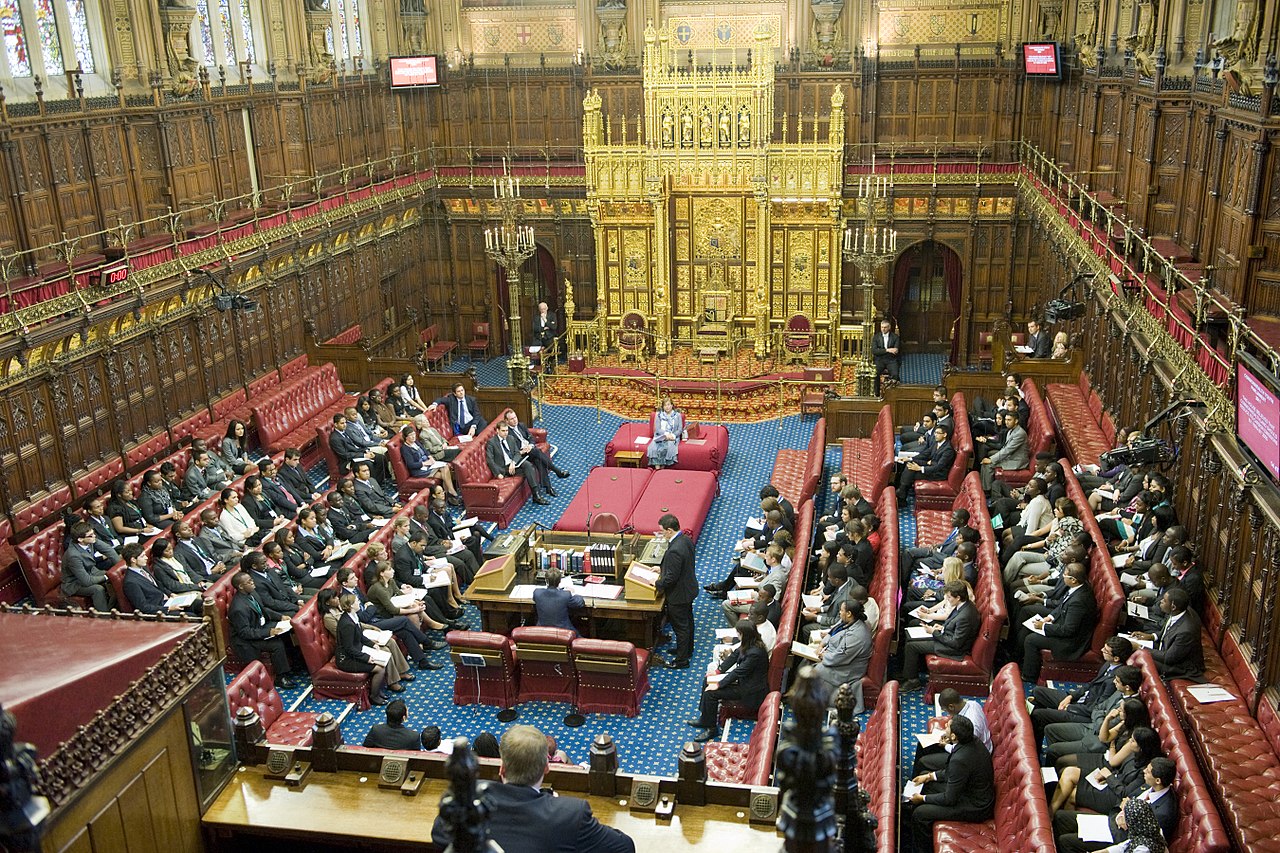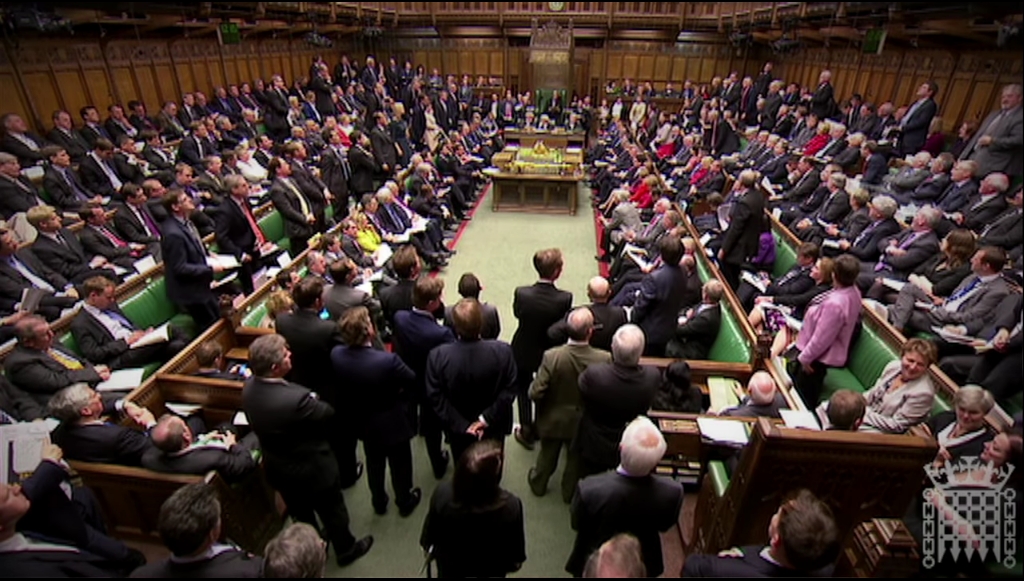by Susan Flantzer
© Unofficial Royalty 2018

The Palace of Westminster; Credit – Wikipedia
The Parliament of the United Kingdom is the legislature of the United Kingdom and consists of an upper house, the House of Lords, and a lower house, the House of Commons. The two Houses meet in separate chambers in the Palace of Westminster, also known as the Houses of Parliament, in London.

The chamber of the House of Lords; Credit – Wikipedia
The House of Lords has two different types of members: the Lords Spiritual, consisting of 26 bishops of the Church of England, and the Lords Temporal, consisting of all the life peers, appointed for life by the Sovereign on the advice of the Prime Minister, and 92 hereditary peers. Before the enactment of the House of Lords Act 1999, all peers were members of the House of Lords. Membership for peers in the House of Lords is now limited to life peers and a limited amount of hereditary peers. Only 92 hereditary peers – the Earl Marshal, the Lord Great Chamberlain, and 90 elected by other hereditary peers – are members of the House of Lords. The creation of new hereditary peerages has greatly decreased with only seven hereditary peerages having been created since 1965 and four of them were members of the British royal family.

The chamber of the House of Commons; Credit – Wikipedia
The House of Commons consists of 650 elected members, each from an electoral district called a constituency. They are known as Members of Parliament or MPs. Elections must be held at least every five years.

Rishi Sunak, Prime Minister of the United Kingdom; Credit – Wikipedia
The Prime Minister of the United Kingdom is the head of the government. Usually, the Prime Minister is the leader of the political party or coalition of parties that holds the largest number of seats in the House of Commons. The current Prime Minister is Rishi Sunak, the Leader of the Conservative Party. Sunak is the first Prime Minister of Indian descent and the youngest Prime Minister in over 200 years. Before 1902, the Prime Minister often came from the House of Lords, provided that his Government could form a majority in the House of Commons. However, as the power of the aristocracy decreased, it became the practice that the Prime Minister should always be a member of the House of Commons. Therefore, the Prime Minister is both head of the United Kingdom’s government and a representative of a constituency.

David Cameron showing John Kerry around the Cabinet Room in 2016; Credit – Wikipedia
The Cabinet of the United Kingdom is a decision-making body of the Government composed of the Prime Minister and 21 cabinet ministers. Cabinet ministers, who are heads of government departments, are selected primarily from the elected members of the House of Commons and occasionally from the House of Lords, by the Prime Minister. The Cabinet has regular weekly meetings in the Cabinet Room of 10 Downing Street, the Prime Minister’s official residence. In the House of Commons, cabinet ministers sit with the Prime Minister on the front bench, hence the term “frontbenchers.”

Sir Keir Starmer, Leader of Her Majesty’s Most Loyal Opposition, current Leader of the Labour Party; Credit – By Chris McAndrew – https://api20170418155059.azure-api.net/photo/X9dwBvuR.jpeg?crop=MCU_3:4&quality=80&download=trueGallery: https://beta.parliament.uk/media/X9dwBvuR, CC BY 3.0, https://commons.wikimedia.org/w/index.php?curid=61331023
The Official Opposition or His/Her Majesty’s Loyal Opposition is usually the political party with the second-largest number of seats in the House of Commons. The Official Opposition is led by the Leader of the Opposition who leads the largest party not within the Government. The Opposition has a Shadow Cabinet consisting of senior members of The Official Opposition who scrutinize their corresponding Government Ministers, develop alternative policies, and hold the Government accountable for its actions and responses. In the House of Commons, members of the Shadow Cabinet sit with the Leader of the Opposition on the front bench opposite the Prime Minister and the members of the Cabinet.

King Charles III of the United Kingdom; Credit – By Mark Jones – This file has been extracted from another file, CC BY 2.0, https://commons.wikimedia.org/w/index.php?curid=69890470
The Sovereign’s Role: The Sovereign of the United Kingdom is the head of state. Royal Assent of the Sovereign is required for all Bills to become law. The Sovereign also has executive powers that do not depend on Parliament including the power to make treaties, declare war, award honors, and appoint officers and civil servants. However, these powers are always exercised by the Sovereign only on the advice of the Prime Minister and the other Ministers of the Government. The Sovereign also appoints the Prime Minister, who then forms a government from members of the Houses of Parliament. This must be someone who could obtain a majority in a confidence vote in the House of Commons. In the past, the Sovereign has occasionally had to make a judgment in the appointment of the Prime Minister. However, today the Sovereign is advised by the outgoing Prime Minister as to whom he or she should offer the position next.

On October 25, 2022, King Charles III had an audience with Rishi Sunak at Buckingham Palace, where he invited the newly elected leader of the Conservative Party to become Prime Minister and form a new government; Credit – The Royal Family Facebook Page
The Sovereign has a weekly Audience with his/her Prime Minister in order to discuss Government matters. The Audience is held in an Audience Room in The Sovereign’s Apartments and is private. Although The Sovereign remains politically neutral on all matters, he/she is able to “advise and warn” his/her Ministers, including his/her Prime Minister, when necessary.
- Official Website of The Parliament of the United Kingdom
- Official Website of The Prime Minister of the United Kingdom
Interested in seeing Parliament in action? Every Wednesday at noon (British time) when the House of Commons is in session, the Prime Minister spends around 30 minutes answering questions from Members of Parliament, called Prime Minister’s Questions or PMQs.
- On the official Parliament website, Prime Minister’s Questions can be seen live or on video at Parliament of the United Kingdom: Prime Minister’s Questions
- In the United States, Prime Minister’s Questions is shown live on C-SPAN and is repeated a couple of times during the week. Another option is to watch the videos at Prime Minister’s Questions – British House of Commons
- For those in the United Kingdom, episodes of Prime Minister’s Questions are available at BBC: Parliament – Prime Minister’s Questions
This article is the intellectual property of Unofficial Royalty and is NOT TO BE COPIED, EDITED, OR POSTED IN ANY FORM ON ANOTHER WEBSITE under any circumstances. It is permissible to use a link that directs to Unofficial Royalty.
